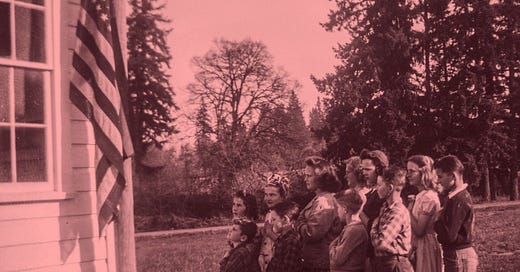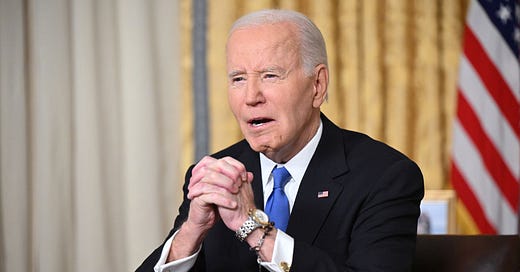
For about the last five years I have been over, completely over, patriotic exhibitions of American allegiance. I am not a killjoy — fireworks are fun, sure thing, whatever — but holy shit does this country suck hard. It sucks so fucking hard, and anyone who actively embraces these ideas of American exceptionalism and imperialism, and espouses unbridled patriotism without literally having to perform patriotism every day of their lives, is a cop. In short, when Ariana Grande said “I hate America” I felt that (minus the fatphobia that fueled the entire scandal)!!!!!
So you can imagine, dear reader, that I was pleasantly surprised to find out that several works embraced nationwide in the name of American patriotism were actually co-opted from socialists, who had penned these songs or poems while envisioning a better world for all. So goes most of the history of history in this country, written by the people who have the power to control it: the Civil War was about “states rights,” not slavery. Martin Luther King, Jr. was a civil rights leader, not also an anti-war or economic justice leader. The American Eugenics movement was defined by “fitter family” contests, not by systemic compulsory sterilization. Etc., etc.
I read about some of these works in We Own the Future: Democratic Socialism — American Style, a collection of essays about the future of banks, healthcare, education, sports, and more, reenvisioned through the lens of democratic socialism. And then I did some research and found other examples of sanitized socialism, and I could not help but think, what a beautiful way to ring in “The Holidays,” by blogging about true “goodwill towards men.”
Of course, this comes with the caveat of glorifying the works of people who were alive during earlier times of legalized human rights abuses: these writers themselves were problematic in their own ways, but the point is that their works were intended to mean something beyond unabashed nationalism. With that in mind, here are four contributions by socialists that we continue to celebrate today.
The Pledge of Allegiance by Francis Bellamy
Francis Bellamy, a Baptist socialist and preacher from Boston, had been fired from his church for teaching that Jesus was a socialist, according to We Own the Future, and for railing against capitalism. According to Smithsonian Magazine, Bellamy wrote the Pledge of Allegiance in 1892 as a marketing gimmick for the magazine Youth’s Companion, which gave U.S. flags to readers who sold subscriptions for the publication. The pledge itself was partially meant as a counter to capitalist individualism and a call for “traditional values.” (One of these values was, as Smithsonian notes, anti-immigrant racism.)
One line stands out from the rest: “One nation indivisible with liberty and justice for all” (notice the absence of “under God,” which was added as a jab to “godless Communism” in 1954). The line itself was intended to “express a more collective and egalitarian vision of America,” according to We Own the Future.
"The New Colossus" by Emma Lazarus
Poet Emma Lazarus, a socialist and feminist activist, wrote the sonnet "The New Colossus" in 1883 and donated it to an auction for raising money for a pedestal for the new Statue of Liberty. Better known as the “Statue of Liberty” poem, it was later added to the inside of the pedestal as a plaque. Though it wasn’t intended to be a beacon of hope and symbolism for new immigrants, with the line, “Give me your tired, your poor, your huddled masses yearning to breathe free,” the poem has developed an association with welcoming vulnerable people to the country.
“America the Beautiful” by Katharine Lee Bates
Katharine Lee Bates, a lesbian, Christian socialist and professor from Boston, wrote the original poem to the song “America the Beautiful” in 1893. Her book, “America the Beautiful and Other Poems,” railed against U.S. imperialism in the Philippines, according to the Los Angeles Times, and she was a part of reform groups around labor rights, urban slums and women’s suffrage in Boston. We Own the Future points to one of Bates’ lines as an appeal for social justice: “And crown thy good with brotherhood, from sea to shining sea.” But other lines stand out as well, such as this one about using material wealth for the common good, according to NPR: “May God thy gold refine, Till all success be nobleness, And every gain divine”
“This Land Is Your Land” by Woody Guthrie
Egalitarian and aspirational, the lyrics of “This Land Is Your Land” are almost obviously socialist: “This land was made for you and me.” According to The Los Angeles Times, Guthrie, a lifelong anti-capitalist and socialist, wrote the song in response to Irving Berlin’s song “God Bless America,” which Guthrie thought “failed to recognize that America belonged to ‘the people.’” The song, which I know mostly by its first verse about the redwood forest and the Gulf stream waters, celebrates but also criticizes the United States, particularly in this last verse: “One bright sunny morning in the shadow of the steeple, by the relief office I saw my people. As they stood hungry I stood there wondering, If this land was made for you and me?”












